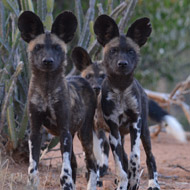
Scientists record ‘social rallies’ of wild dogs in Botswana
Wild dogs use sneezes to vote on when the pack will move on and begin hunting, according to new research.
Published in Proceedings of the Royal Society B, the study suggests that African wild dogs hold high energy greeting ceremonies called ‘social rallies’ after periods of rest before they move off together again.
The more sneezes that occur during these rallies, the more likely it is that the pack will leave.
The behaviour was observed by an international team of scientists while studying African wild dogs in Botswana.
Senior author Dr Neil Jordan, a research fellow at the University of New South Wales, said: “I wanted to better understand this collective behaviour and noticed the dogs were sneezing while preparing to go.
“We recorded details of 68 social rallies from five African wild dog packs living in the Okavango Delta in Botswana, and couldn’t quite believe it when our analysis confirmed our suspicions.”
But there is a further twist to the tail, as the study’s first author Reena Walker of Brown University in the USA, explained:
“We found that when the dominant male and female were involved in the rally, the pack only had to sneeze a few times before they would move off. However, if the dominant pair were not engaged, more sneezes were needed - approximately 10 - before the pack would move off”.
It was previously thought that the dogs were just clearing their airways when they sneezed.
Dr Andrew King of Swansea University and co-author of the study said: “The sneezes act as a type of quorum, and the sneezes have to reach a certain threshold before the group changes activity.
“Quorums are also used by other social carnivores like meerkats, but our finding that the quorum member of sneezes changes, based on who’s involved in the rally, indicates each dog’s vote in not equal”.
Image (C) Amanda Black.



 The veterinary mental health charity Vetlife is inviting the veterinary community to join it for a sponsored cold-water dip.
The veterinary mental health charity Vetlife is inviting the veterinary community to join it for a sponsored cold-water dip.